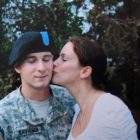Connecticut veterans’ leader and decorated soldier Stephen Kennedy has won his eight-year battle to have his Army discharge status upgraded to honorable. Kennedy, of Fairfield, president of the Connecticut branch of Iraq and Afghanistan Veterans of America (IAVA-CT), will continue his federal class action lawsuit on behalf of Army veterans nationwide who received less than honorable discharges for behavior later attributed to Post Traumatic Stress Disorder (PTSD). Kennedy said in an interview that his Army service “was really central to my identity. I was really proud of that. To have them say it was less than honorable, to have that kind of stamp on it…has been a cloud over the memory of my service.”
“It’s hard not to really take that to heart,” he said, adding that having the upgrade “really feels great.”
The Army Discharge Review Board reversed Kennedy’s previous status called “general under honorable,” which deprived him of veterans’ education benefits and the pride and respect connected to an honorable discharge. Kennedy, 31, served in Iraq for 13 months. In the Army, he was given leadership positions, fast-tracked to become a sergeant and honored with several awards including the Combat Infantry Badge, Army Commendation Medal and Army Achievement Medal. His discharge status was based on his going Absent Without Leave (AWOL) for his wedding and honeymoon, a behavior he later said was uncharacteristic for him and based on PTSD, which had resulted from his military service. He had become suicidal and self-destructive, cutting himself and drinking and smoking heavily.


